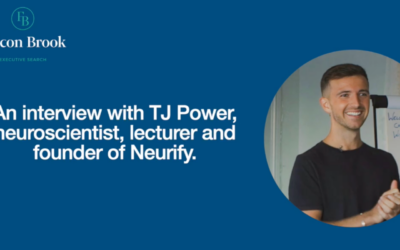Falcon Brook Search spoke to Laura to find out how, and to learn more about the extraordinary career that led to being awarded the CBE in the last New Year’s honours list.
FBS: It’s a pleasure to be speaking to you today and our congratulations on being recently awarded the CBE.
Before we speak of diversity and the energy transition, tell us more about how you came to work in energy?
Laura Sandys: I was a despatch rider after I left school at 17, delivering parcels around London for two years before setting up what was essentially a PR company. I had this idea that it would be easier to get a job with a business card! I ended up staying with my own business which I eventually sold. Then I set up a public affairs company. I was working out of my garage when I signed BP as my first customer.
BP was eventually my largest customer when I sold that company in 1999. By then we had become an energy and utility specialist, working with Severn Trent and BT among others. After 1999 I went to work with the Georgian government on the Baku-Tbilisi-Ceyhan pipeline. That set my career path working with governments around regulation, development and international relations, a lot of it in the energy sector.
FBS: What prompted you to set up POWERful Women?
Laura Sandys: I launched POWERful Women with Sandy Verma. She was then Minister responsible for nuclear energy confronted with the fact that every meeting she attended lacked diversity.
POWERful Women set the challenge that 30% of boards should be women, though our real focus was developing the pipeline. We provide tools to women joining the industry around some of the key career blocking points: how to ask for a higher salary, how to navigate a promotion, how to start a conversation when you are not happy with your work. They unlock some of the issues in situations like a man being given a promotion while many competent women are overlooked. We also mentor women and profile them within their own companies as well as externally.
FBS: So how does diversity link with the energy transition?
Laura Sandys: It’s about achieving a shift from a vertical ‘command and control’ energy sector with clearly defined roles and little ambiguity to a distributed market where every car and heat pump becomes an energy source and provider. In the UK alone, this means moving from 400 companies controlling power to hundreds of millions of assets such as electric vehicles and heat pumps.
The evolution of this old-fashioned industry into a multi-dimensional, complex, customer-oriented sector means a shift from an engineering challenge to a very complex systems problem. The energy world is going to have to understand customer behaviours and be open to new business models involving several sectors as they stack value propositions. Collaboration, innovation, creativity, and engagement with customers are going to be crucial to unlock the flexibility that the system requires.
A business that wins the electric vehicle charging contract with Motability has more than a great electric charger. They know how to engage people in a wheelchair or who might have sight problems. If you can design electric vehicle charging around someone that has a disability it will also be a great product for everyone.
The point is we are moving from an engineering problem to a total system that includes consumers. It’s where the energy transition ‘rubber hits the road’ – and that road is human beings. The engagement, the proposition, the business mind is different.
In this new world of different assets, drivers, value streams, propositions, you’re going to have to have new talent. You need people who are curious and who are going to push boundaries and challenge the status quo. The status quo got us where we are today. Challenge it now is not a nice to have – it’s a necessity.
Most industries are generally happier with incremental change. But change is often driven by new types of companies so businesses looking to stay in the game must examine how they do things as well as what they do. The ‘how’ is generally much more difficult. This is where we need diversity.
FBS: What does this mean in terms of talent?
Laura Sandys: We need engineers who truly understand customers and customer-focused businesses that truly understand engineers. Adaptiveness and curiosity will be vital, as well as a culture that permits mistakes. One minister said at a meeting recently, “the destination of net zero is clear, but the journey will be messy and there will be mistakes”. We must accept less than perfect interim solutions because it’s too important to wait for perfection.
The interesting thing about women’s careers – and you can see this in women’s CVs – is there is a lot more diversity of experience. It can cause concern if a female candidate isn’t an engineer from top to toe or isn’t committed to sales. In this new world you need people who have been involved in lots of different areas.
FBS: We find women especially thriving in younger renewables businesses and emerging sectors like hydrogen. Why do you think that is the case?
Laura Sandys: I would say women become impatient in their late 30s and early 40s women, and they also become bored.
Traditional energy businesses can now easily attract women especially at that early recruitment stage. Increasingly women also have their children in these big companies because they give a lot of protection and stability. The issue seems to be career progression. The path is to move from being sales director for the southeast of England, to sales director for England, then the UK and Ireland, then EMEA. I’m getting different business cards and I’m being paid differently but I’m essentially doing the same job for 15 years. I think women become bored within this defined hierarchical structure. They demand more from their work.
I spoke to three women all leaving senior jobs for this reason, one of them to set up a florist, the other two into smaller companies where there was a sense of purpose. Sometimes we’re trying to squeeze diversity into a system that ultimately spits women out.
FBS: Do you think businesses are doing enough around flexibility?
Laura Sandys: During the pandemic there was a discrepancy between those people who could have flexibility and those that had to continue to go into work. It created a divide and I think it will continue to do so.
Real and deep flexibility is very difficult because younger people want to go into the office, people with children don’t, and older people quite like going into the office if they can choose. The problem about the middle cohort is that they are the business drivers and managers. If they are not there, there is a disconnect and it can be very difficult to build teams. People feel like a commodity when they work from home. If you’re not connected, then it’s easy to be actively disconnected. You’re no longer part of the family.
FBS: Laura, thank you so much for your time today.



